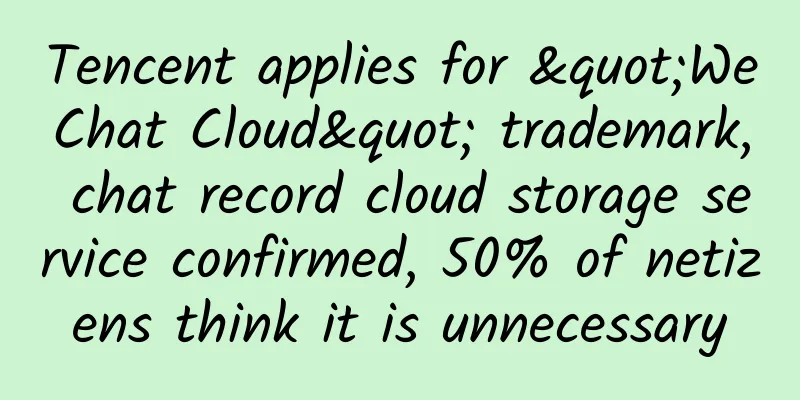Tencent applies for "WeChat Cloud" trademark, chat record cloud storage service confirmed, 50% of netizens think it is unnecessary

|
According to Tianyancha, Tencent is applying for the WECHAT CLOUD trademark. The trademark classification involves four categories: website services, scientific instruments, communication services, and advertising sales. Among them, the "website service" trademarks will be mainly used for electronic data cloud storage services, electronic data backup services, software and services (SaaS) and platform as a service (PaaS) and other goods/service items.
This proves that the previous online news that "WeChat plans to launch a paid cloud storage service for chat records" is not groundless. Judging from the time of the trademark application, it can be inferred that this may be a project that Tencent has been planning for a long time. Of course, Tencent’s launch of a chat history cloud storage service is actually nothing new. As early as 2007, Tencent officially launched the "chat history roaming" function based on QQ membership service in the official version of QQ 2007 II. After turning on this feature, users can choose to browse the chat records of all friends in the past month or permanently browse the chat records of a few specified friends (based on VIP level). Currently, Tencent QQ is still continuing this classic chat history storage service, but has made some changes to the specific service content. Specifically, non-VIP users can enjoy 7 days of free roaming service, VIP users can enjoy 30 days of roaming service (10 yuan/month), and SVIP users can enjoy up to two years of roaming time (20 yuan/month). If you need 5 years of roaming service, you need to activate the annual fee SVIP status (240 yuan/year). According to earlier reports, WeChat's "chat history cloud storage service" may adopt an annual payment model, with Apple users paying around 180 yuan/year and Android users paying around 130 yuan/year. At present, the WeChat chat history cloud storage project is underway. The official has not yet disclosed more details, but the relevant news has attracted the active attention of netizens. In a poll of 100,000 people, about 50% of netizens believe that WeChat chat history cloud storage service is unnecessary. Many users said that local backup also has advantages, and the 180 yuan annual subscription service is too cost-effective, and there is no real confirmation of the specific cloud storage data capacity that users have under the annual fee. In addition, chat records are stored in the cloud. Once the data is leaked, it may cause a large amount of privacy leakage. This is also an issue that users cannot ignore during use. Of course, based on the needs of using chat records as electronic evidence and reducing mobile phone ROM usage, many users believe that chat record cloud storage services are necessary. To do it or not, this is a question that will take time to answer. But it is undeniable that the chat record cloud storage service will further expand Tencent's monetization capabilities on the WeChat platform. In the future, will WeChat develop into the second QQ filled with the smell of money? Let us wait and see. This article is reproduced from Leiphone.com. If you need to reprint it, please go to Leiphone.com official website to apply for authorization. |
<<: Five UI styles for the second half of 2021, there must be one you like!
>>: Huawei Hongmeng continues to open up: Ark JS runtime is officially open source
Recommend
New Bug Exposed in iOS 10.2: Say Goodbye to the Era of CDs?
According to a report by Cult of Mac, iOS 10.2 do...
Given a scenario, can Alipay recreate an Alibaba?
In the past few days, we have witnessed a miracle...
91 Ten Articles: Tesla's brake failure occurred again in Hangzhou, BMW will launch a hydrogen fuel cell X5 crossover
1. Xpeng Motors' first quarter financial repo...
Ten thousand words of operational knowledge: How to plan an efficient marketing and operation plan?
In recent years, mobile Internet has developed ra...
In the education industry, how should information flow advertising be used?
Recently, the investment guidelines for major ind...
Will traditional car companies become assembly plants? Is the Foxconn model suitable for the automotive industry?
Foxconn does not design, market or sell a single ...
Alien "agents"? Back off! Back off! Back off!
Recently, Zhongshan Port Customs intercepted cock...
Alibaba campus recruitment: Talking about interviews and interview questions
[[139917]] About interview questions Interview qu...
Master these 12 operating methods to help you get rid of the stereotyped activity gameplay
I know that it is not easy to be a content operat...
Increase followers by 330,000 in one go: How to organize an event that will explode in the circle of friends?
As we all know, online activities, especially onl...
Lao Duan talks about OTT: The lost decade of cable TV
In the past 20 years, cable networks have focused...
Teach you step by step how to view nearby people
The tutorial shared today is to teach you how to ...
An inventory of the characteristics of major information flow channels such as Baidu and Tencent, save it now!
With the development of social media , Weibo, Ten...
Xiaoyu Tanqi 2022 [Second Phase] Real-time Trading System Training Camp
Xiaoyu Tanqi 2022 [Second Phase] Real-time Tradin...
The mystery behind Shenzhen's rapid rise in the Internet
[[130276]] While Shanghai's Internet industry...









